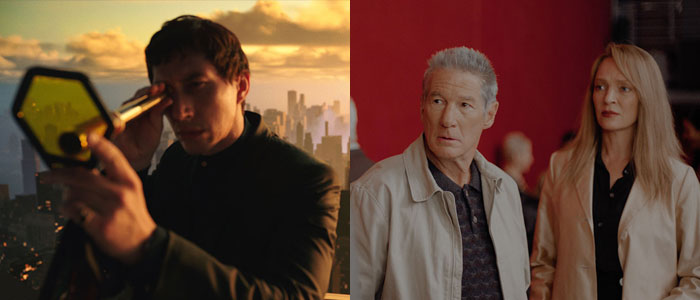MEGALOPOLIS
***/****
starring Adam Driver, Giancarlo Esposito, Nathalie Emmanuel, Aubrey Plaza, Shia LaBeouf
written and directed by Francis Ford Coppola
Oh Canada
***/****
starring Richard Gere, Uma Thurman, Jacob Elordi, Michael Imperioli
written by Paul Schrader, based on the novel Foregone by Russell Banks
directed by Paul Schrader
by Angelo Muredda Here at last is Megalopolis, Francis Ford Coppola’s long-delayed, triple-XL-sized work of utopian science-fiction, in development since the late 1970s and emerging nearly 50 years later not as the mid-career capstone once intended, but as a kind of valedictory address on the importance of family and the timelessness of unrestrained baroque aesthetics. Funded at last by 120 million dollars worth of the filmmaker’s stake in his winery (presumably diminishing the future inheritance of several Coppola cast members in the process), the film is impossible to divorce from its outsized origin story. The making of Megalopolis is allegorized in a pleasantly goofy way in its fable of an uncompromising and misunderstood architect named Cesar (Adam Driver), whose radical vision of the titular hypothetical city, rising from the decadent rubble of the downtrodden New Rome, clashes with the more conservative urban planning of his arch-nemesis mayor, Cicero (Giancarlo Esposito). The war between the two men for what will become of New Rome, mediated by yellow journalists like Wow Platinum (Aubrey Plaza), decrepit financiers like Cesar’s uncle Cassius (Jon Voight), snivelling populist politicians like Cesar’s spiteful cousin Clodio (Shia LaBeouf), and Cicero’s dilettante socialist daughter–and Cesar’s eventual lover–Julia (Nathalie Emmanuel), becomes a proxy battle for what’s to come of the human race: stasis and tedium or dynamic big swings. The future, Coppola suggests, is an unknown country that we may be so lucky to dwell in: It can either give in to conservative values about the status quo and fall into permanent decline, or welcome with open arms the next generation, in the form of Cesar and Julia’s child–not to mention films like Megalopolis, ostensibly a proof of concept that bold ways of seeing and doing are worth the investment.
For Coppola, at least, that seems to be true. It goes without saying that Megalopolis is a mess, the sort of thing only a financially liberated octogenarian artist with no obligations to either studios or the bounds of good taste could make. At times, that lack of discipline is draining rather than energizing, as in the overlong #metoo-themed tangent where Cesar and a pop star (Grace VanderWaal) prized for her virginal aesthetics are briefly cancelled over some Clodio-planted deepfakes, with Cesar’s good name further sullied for lingering rumours about his possible involvement in his beloved wife’s death. Whatever vaguely interesting things Coppola may be saying about the younger generation’s puritanism as a sickly cultural regression–bound up in his curious casting of his famously shallow nepo baby granddaughter Romy Mars as a young gossip reporter for “The Dingbat Times”–isn’t worth the effort. There’s also an air of old-man stink to the nose-thumbing casting, which pits famous deadbeat father Voight against famously violent, once-promising star LaBeouf, and finds the somewhat less infamous creep Dustin Hoffman waiting in the wings as Cicero’s fixer. Between the known pests and the numerous Coppola kin (including Talia Shire and Jason Schwartzman), the film sometimes has the feeling of a make-work project, an Adam Sandler movie designed to keep his family and friends’ lights on.
Yet watching Coppola paint on this large a canvas is not without its pleasures. Busy as it is, Megalopolis never feels protracted or boring. A gregarious showman and a host at heart, Coppola is a master of pacing, rather like Cesar, whose signature invention of megalon, a mysterious building material that’s basically a metaphor for the transformative properties of cinema, allows him to manipulate time and space at will. With its endlessly inventive split-screen sequences, neon-light-bathed bacchanalian party scenes, silent-film homages, and expressionist camera angles, the film splits the difference between the stylings of Abel Gance and Joel Schumacher–the garishness, the bold cityscapes, and Cesar’s benevolent soft-fascist inclinations to remake his rotten city for the better at all costs evoking both Napoleon and Batman Forever.
Those echoes aside, this is undeniably Coppola’s film. Though its stylistic restlessness most evokes the lyricism and playful practical effects of Bram Stoker’s Dracula and Youth Without Youth, Megalopolis also improbably recalls The Godfather in its earnest preoccupation with the stressful but reassuring pull of family, which lies at the heart of Cesar and Cicero’s duelling conceptions of the world. It’s not for nothing that Coppola mentions his own name in the film twice, revealing it to be Cesar’s favourite name for his would-be child–if it’s a boy–and Cicero’s birth name. It’s as though Coppola projects himself into both the put-upon provider and decision-maker as well as the child who may one day inherit the fruit of his work, should that work be blessed enough to endure. Whether Megalopolis has the kind of critical afterlife its filmmaker clearly hopes it will, there’s a sweet quality to its hopefulness in the face of things trending down in every direction, and a gentleness to its commitment to the family as the only cultural institution that might endure, that might be worth something, which finally makes it hard to resist–cranky carnival-barker asides and all.
Paul Schrader swaps a notebook for a camera in Oh, Canada, his immediate successor to the philosophically dense but minimalist man-in-a-room trilogy that served as a bold new chapter in his career, starting with 2017’s s First Reformed and followed by 2021’s The Card Counter and 2022’s Master Gardener. Where those films’ protagonists jot down their confessions of spiritual turmoil and guilt to expiate them in writing, Leonard Fife (Richard Gere), an American draft dodger turned Canadian documentarian for the NFB, tells it to the apparatus he’s wielded throughout his career for the interrogation of others. In the final stages of dying from cancer, Leonard gives a retrospective interview to his former film students turned documentarians (led by Michael Imperioli and Victoria Hill), convincing himself it’s actually an opportunity to let his much younger wife, Emma (Uma Thurman), get to know him.
Oh, Canada is at once a slighter and more formally fussed over text than Schrader’s recent work, despite sharing with it a certain stylistic austerity. Developed from the novel Foregone by Russell Banks, who Schrader had previously adapted in Affliction (and to whom Oh, Canada is dedicated), the movie’s telling of Leonard’s fairly minor life story has a dense, literary quality that Schrader revels in translating to film, where Leonard is typically most at home but where he now finds himself the object rather than the subject of the camera’s gaze. He’s at once telling that story to his wife (in the form of a quintessentially Schrader confessional), the directors, the spectators of the as-yet-unfinished documentary the interview will yield, and to us, the spectators of Schrader’s film (rather than Imperioli’s). In a further disorienting structural gesture, his narration, which drifts in and out of the past in a dazed manner thanks to his chemo-addled brain, is interwoven with the voiceover of his abandoned adult son, Cornel (Zach Shaffer), who gives us a cryptic account of his father’s death before Leonard has begun his own account of his life. Young Leonard is also alternately portrayed by Jacob Elordi and Gere, as though the older Leonard is forgetting his age, projecting different versions of himself back at all the wrong points–mixing up seasons and outfits and even romantic partners, whose names he admits eventually ran together in his mind.
Needlessly complicated and centred as it is on one man’s cowardice and habit of falling backwards into the decisions that defined him–which makes him the opposite of the socially committed artiste engagé the filmmakers claim he is when pitching him on the project–Oh, Canada is a more acquired taste than, say, the climate crisis cri de coeur of First Reformed. A number of its revelations about our unreliable narrator’s lapses in memory and judgement hardly shock the way they’re meant to, leaving Thurman’s outsized reactions feeling out of sync and playing like overly familiar postmodern fiction about storytelling and time. It doesn’t help that Elordi is an empty vessel for Leonard’s memories, looking good, like Gere in his prime, but otherwise lacking any substance or edge. There’s an undeniable clunkiness, too, to some of Schrader’s storytelling choices, from Cornel’s unnecessary voiceover intrusions–so perfunctory the character might as well be played by either Elordi or Gere himself–to the title, bathetically spoken aloud in a late moment that configures Leonard’s decision to bail to his adoptive country rather than return to his home in Massachusetts as his Rosebud moment.
Still, one would be remiss to refuse another bitter pill from Schrader at this stage in his career, and by the end, Leonard’s self-retrospective is moving and illuminating because of rather in spite of the fact that he’s a scoundrel. Don’t bad people die painfully in nondescript rooms, too? Schrader looks unsparingly at old age and dying, vividly evoked here by the faint trace of medicine and drying feces Leonard imagines a young PA can smell on him as she’s miking him on set. Schrader has plenty left to say about memory, art, and the impossibility of forgiveness, too, the way mediocre men who happen to be decent artists may successfully launder their reputation through their work, yet never quite get the stain out of their souls. Programme (both films): Gala Presentations



![I Know Who Killed Me (2007) + Captivity (2007) [Uncut] - DVDs 6a0168ea36d6b2970c016766b08a2f970b](https://filmfreakcentral.net/wp-content/uploads/6a0168ea36d6b2970c016766b08a2f970b.jpg)

